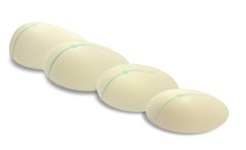Polyurethane coated implants, supplied by Polytech in the UK may be a solution. These implants have been used in South America for the last 35 years, and were used for a short period of time in the US, but were withdrawn from USA, alongwith all silicone implants in the 1990s during the years of ‘silicone controversy’. The other finding has been the presence of 2,4TDA (toluenediamine) in the urine of women with these implants. But this has finally been resolved too, as TDA has been found in urine of women with no breast implants. Polyurethane is also used in other prosthetics such as heart valves and pacemakers, so safety is no longer an issue.
The polyurethane coating does two things:
- It reduces the rate of capsular contracture to 1-3% at 15 years by stabilising the collagen fibres that make up the capsule, preventing these from sliding over each other and causing the capsule to contract like a ‘shrink-wrap’.
- As a result of the polyurethane coating, these implants stay where they are placed, a distinct advantage when tear-drop (aka anatomical or natural-shaped) implants are used, thus preventing rotation of the shaped implant.


 RSS Feed
RSS Feed





